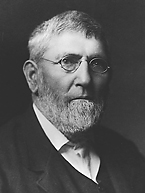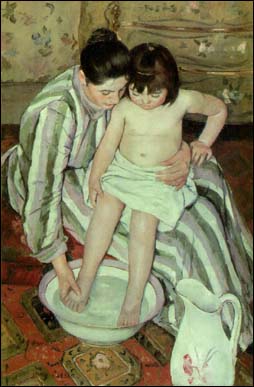Ex Church of Christ support groupHome * Website Purpose * History * UnBiblical Teachings
* Spiritual Abuse Jesus' View of God
* Faith & Works
* New Covenant
* The
Pattern * Romans 14
| |
|
_____________________________________________
Alexander Campbell strongly influenced another Scots ex-Presbyterian preacher, Walter Scott,
with the logic of Sir Francis Bacon. Scott
even founded a college named
Bacon College in 1836. Neither Barton W. Stone nor Campbell ever said that unimmersed believers were lost, but Barton W. Stone was the one in the beginning that kicked up the greatest fuss when the more radically minded Scott preached salvation by immersion (even though he believed immersion was biblical baptism, and that baptism was for the forgiveness of sins). Walter Scott pushed the sectarian vision in the Church of Christ in Tennessee, Kentucky and northern Alabama, though they vehemently denied they were a sect. They were the one true church established by Jesus Christ, the first restoration of the original church. He taught a six-fold Plan of Salvation, which he reduced to five steps so that he could use the five fingers of one hand to help people remember it:
1. Believe that Jesus is the Messiah (this came from John Locke's
Unitarian writings) Predestination Presbyterians at that time believed that God chose, before one was born, whether one was saved or not, and that the only thing one could do about salvation was to wait on God's call. Having been baptized by sprinkling as infants, many Presbyterians were not accepted into communion until they could relate to the elders a convincing account of their call from God. One woman was jealous when her son only waited three months for God's call, she had had to wait seven years, anxiously crying out to God. When the Stone-influenced churches heard that the early believers only had to be dunked in water to be assured of salvation they were thrilled and spread this new gospel like wildfire. They felt freed from the shackles of a burden too great to bear, and felt grateful that the God they worshipped was freely merciful. They couldn't wait to tell everyone how wonderful this God was. The old Presbyterian method of salvation depended wholly on God, with no input from the person, a plan of salvation that made the person feel helpless and untrusting of God until--and if-- they person had been called. Scott preached that all are called, and anyone can respond of their own free will, and God's reply would be to live in their hearts via the Holy Spirit. Eventually (see sidebar**) baptism was considered invalid if it was not in the right order of the Plan, was not specifically for the forgiveness of sins, was not for salvation, or was for membership in a fellowship other than a Church of Christ. Eventually the Church of Christ's five part Plan emphasized only human obedience, the six part Plan added number six: "live faithfully until death." This emphasis on human obedience has led hard-line members of churches of Christ to doubt their salvation and even to go so far as to believe that anyone who is sure of their salvation is arrogant. The Churches of Christ have come full circle, and are again in need of good news. Legalism is a forbidden fruit that promises simplicity and control, but delivers uncertainty and despair. The early reformers used the term nondenominational to mean that all were welcome and included in the body of Christ regardless of denominational affiliation (and that denominational affiliation discouraged unity). Within twenty years the term nondenominational came to mean "all the denominations are wrong" and "we are the only ones saved." This attitude of being the One True Church is illustrated by the Churches of Christ's most popular tract in the 1960s:Neither Catholic, Protestant or Jew***, a slogan that is still used in many websites for Churches of Christ. This attitude continued well into the 1980s, when a split began to occur between those who wanted to accept outsiders as fellow believers, and those who still saw themselves as the only church. This split had some earlier pre-tremors in the 1950s when a ten percent splinter group (the noninstitutional churches of Christ) split off from the richer more progressive mainstream Churches of Christ over how to collect money for organizations like evangelistic radio shows and orphanages. David Lipscomb
David Lipscomb was one of the last great preachers in the Restoration Movement to advocate separation from this world in the sense that Christians are not to participate in civil government, that civil government is hopelessly inadequate compared to the government of God, the church. In this sense he reflected the poor man's sense of disenfranchisement from the prosperity of the nation. Although David Lipscomb could disagree and discuss many subjects, once a split was inevitable he epitomized the present day attitude of hard-line churches of Christ in stating unequivocally that the Disciples of Christ who wanted organs and missionary societies did not love God or want to obey God. It was simple: he was right and in agreement with God and they were wrong and therefore sinful.
|
**This was changed by later preachers to the five-foldPlan of Salvation: --Present day Plan of Salvation ***"the church of Christ is neither Catholic, Protestant, nor Jewish. We are unique and different for we are endeavoring to go all the way back to the original New Testament church. Using the New Testament as our blueprint we have reestablished in the twentieth century Christ's church. It fits no modern label. It is not just another denomination." --Batsell Barrett Baxter and Carroll Ellis
Legalism is a forbidden fruit that promises simplicity and control, but delivers uncertainty and despair.
"The Bible is science, is knowledge, classified by God." --David Lipscomb "Can two walk together when one insists on walking in God's ways and the other insists on going another way?" --David Lipscomb
|
 Hughes
believes that David Lipscomb was the last great leader to continue both the attitudes of Barton Stone and
Alexander Campbell into the 20th century. He was adamantly against getting rich
and never took a salary his entire life. He served as editor of the influential Gospel
Advocate for many years, a magazine based in Nashville. He helped to
found the Nashville Bible School, but balked when they wanted to elect trustees,
saying that organizations bigger than the local congregation were unscriptural
to carry out the Lord's commands.
Hughes
believes that David Lipscomb was the last great leader to continue both the attitudes of Barton Stone and
Alexander Campbell into the 20th century. He was adamantly against getting rich
and never took a salary his entire life. He served as editor of the influential Gospel
Advocate for many years, a magazine based in Nashville. He helped to
found the Nashville Bible School, but balked when they wanted to elect trustees,
saying that organizations bigger than the local congregation were unscriptural
to carry out the Lord's commands.
